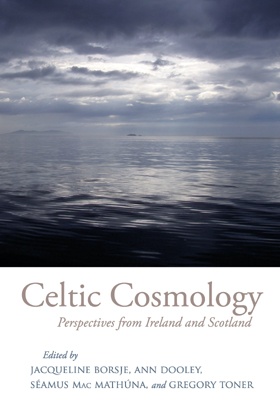
Celtic Cosmology: Perspectives from Ireland and Scotland
Papers in Mediaeval Studies 26. 2014. viii, 316 pp.
ISBN 978–0–88844–826–2 • Cloth • $90.00
The essays in this collection, many originally presented at a 2008 colloquium on Celtic Cosmology and the Power of Words, aim to examine the worldviews held by the Celtic peoples, particularly the Gaelic (Irish and Scottish) perspectives; the main sources are inscriptions and texts in Celtic languages and in Celtic Latin.
From the deep sea to the waters above the sky, from the world beneath our feet to the promised land across the ocean – this volume represents a search for traces of cosmologies in Celtic sources, especially those of Ireland and Scotland. These cosmological traces are investigated for their Indo-European and Semitic parallels and influences. The broad world orderings – Celtic tripartition (earth, water and sky) and Christian bipartition (this world and the next) – are explored, and the cosmological meaning of specific demarcations in the landscape is analyzed. The world was mapped with words, as signposts for contemporary and future generations. These written “maps” are not only geographical, they also constitute ethical and mythological guidelines. Through storytelling, landscape and social space are processed in a framework of cosmic good and evil. In a Celtic mental world roads, rivers, mountains and hills are vital markers. Hills and caves were used in rituals and were seen as entrances to a subterranean otherworld where supernatural beings dwell and knowledge of the cosmos was believed to reside with these supernatural or subterranean beings. This knowledge is connected with protection and violation of the landscape and waters, and is often associated with the king, truth and justice. In the socialized landscape features of periphery and centre are closely related to kingship: thus, looming tragedy can be deduced from the route that a mythical king takes; royal capitals are outlined in landscape and architecture as ritual centres. The naming of significant places is a human act of creating order. In the Celtic literary tradition of explanatory and etymologizing stories, place-names serve as signifiers and warning signs (taboos) and some Celtic narratives on naming places appear to function also as performances of atonement for disruptions of the cosmic order.
View prelims and contents.
Editors
Jacqueline Borsje is Professor of Medieval Irish Culture and Religion at the University of Ulster and Senior Lecturer in the Cultural History of Christianity at the University of Amsterdam. Her research ranges widely across the religion, mythology, and literature of medieval Ireland. She is the author of The Celtic Evil Eye and Related Mythological Motifs in Medieval Ireland (2012).
Ann Dooley is Professor Emerita of Celtic Studies and Medieval Studies at the University of Toronto. She was co-founder of the Celtic Studies Program at Saint Michael's College, University of Toronto, which she directed for fifteen years. She is the author (with Harry Roe) of Tales of the Elders of Ireland (1999), and Playing the Hero: Reading the Irish Saga Táin Bó Cúailnge (2006), as well as numerous essays.
Séamus Mac Mathúna is Professor of Irish and Celtic Studies and former Head of Irish and Director of the Celtic Studies Research Institute at the University of Ulster. He is Founding President ofSocietas Celto-Slavica, general editor of Studia Celto-Slavica, consultant editor of Studia Celtica Upsaliensia, and is a committee member of the Royal Irish Academy's Foclóir na Nua-Ghaeilge(Historical Dictionary of Modern Irish).
Gregory Toner is Professor of Irish at Queen's University, Belfast. He edited the electronic version of the Royal Irish Academy's Dictionary of the Irish Language based mainly on Old and Middle Irish Materials and has produced a supplement for an extended and revised version of the dictionary (www.dil.ie). He is also editor of Ainm: A Journal of Name Studies.
Endorsements
“The Greeks and Romans remarked on the knowledge of the druids concerning the workings of nature, and reverence for the Creator and delight in His creation are recurrent concerns of the religious poetry of medieval Ireland and Wales. In one Old Irish story, a saint and a visitor from the Otherworld discourse concerning 'the heavenly and earthly mysteries.' The essays in this learned, stimulating and accessible collection explore manifold aspects of the perennial preoccupation with the cosmos evinced by the Celtic peoples: the contents range from the Indo-European roots of the Celts to the riches of medieval Irish literature, and on to the Gaelic folktales and folkways of the recent past. With an exhilarating interdisciplinary breadth (including philology, mythology, archaeology, theology, folklore and literary studies), and deploying a masterly depth of expertise, the contributors have produced a volume whose interest is as comprehensive as its theme.” – JOHN CAREY, University College Cork
Reviews
“... In addition to contextualizing the essays and setting the parameters of the volume, Borsje also issues a sweeping call for a great deal more research in a range of areas. Indeed, the impression given by the end of the Introduction is that the entire broad, interdisciplinary, and highly complex topic is wide open for further study – even at the level of some truly fundamental concepts. ... Celtic Cosmology is an absorbing book, and the standard of all the contributions is high. ... Even the production quality is exemplary.” – Jessica Hemming, in Folklore (2016)
Ordering
To order this book, please print and fill out the convenient PDF order form. Detailed information about ordering, including sales territories and methods of payment, is available on our ordering page. PIMS books are also available on Amazon.ca (for Canadian customers) and Amazon.com (for customers in the U.S.).


